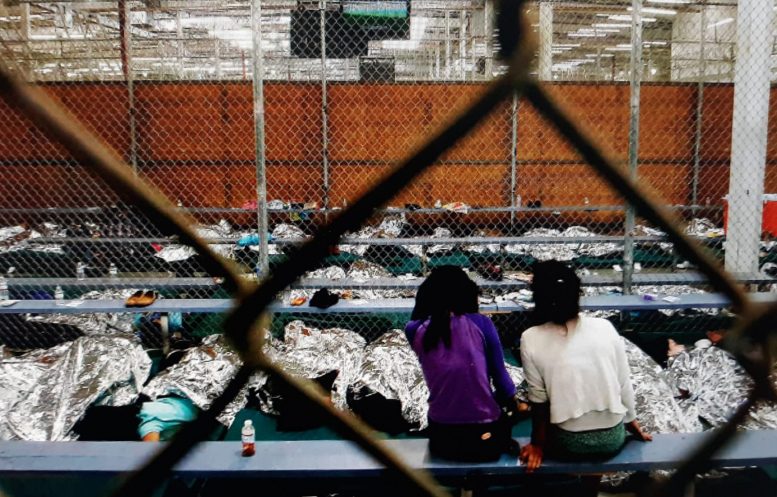By JAN LARSON McLAUGHLIN
BG Independent News
The U.S. asylum process is broken. And despite efforts to halt the separation of families at the southern border, children are still being held at detention centers with no system in place to reunite them with their parents, according to people who advocate for the children.
A program on “Children in Captivity,” hosted by LaConexion this week, told of three children held in detention centers, who testified about their experiences to bilingual lawyers and a pediatrician who were allowed to visit them in the facilities in June of 2019. Because of the violations they witnessed, the lawyers decided to release the testimonies to the media.
A 12-year-old girl told of coming to the U.S. from Ecuador with her grandmother, and her sisters, ages 8 and 4, to join her parents who were already in the U.S. The border patrol took everything they carried with them, she said.
In the facility, the toilets did not flush, there was no soap to wash hands, and no showers. There were no provisions so children could brush their teeth or wash their clothes.
It was very cold inside and bright lights were on 24 hours a day. The children slept on the floor with a thin sheet, she said.
In the middle of one night, officers came and took her grandmother away.
“Thinking of this makes me cry,” the girl told the attorneys. As the eldest sibling, she tried to comfort her young sisters. “Every night they cry for our grandmother and our mother.”
The girl said children are fed, but small portions, and never vegetables or milk.
“I am always hungry. Everyone here is hungry,” she said.
Many children in the facility who were separated from their parents were so young that they didn’t know where they came from or where they were supposed to go.
“Children should not be here,” the girl said.
In another interview, a 5-year-old boy told of being separated from his father when they crossed the border. He slept on the floor in a cold facility.
“I am frightened, scared and sad,” he said.
The last story came from a 16-year-old mom with a 1-year-old son. They were picked up by border patrol after crossing the river into the U.S. She told of being “put in a cage” in a large building. Her stories were the same of very cold buildings, bright lights on round the clock, and foil blankets.
There were no toilets in the cage, no water and no soap.
There was no food suitable for her baby, and the food given to the mother was so limited that she could produce little milk for him, she said.
Her baby came down with a cold and cough, but “there was no doctor.”
The testimony of the children is intended to make more Americans aware of the treatment of people seeking asylum in the U.S.
“They are bearing witness with their very difficult stories,” said Valeria Grinberg Pla, a Bowling Green State University professor who hosted the program.
On any given day, there are between 35,000 and 50,000 immigrants being held in U.S. detention – with many being children.
“You are hearing the actual words of the children,” said Lee Sunday Evans, artistic director of the Waterwell Flores Exhibits. “These are extremely difficult stories to listen to.”
Advocates for children being held in detention centers also spoke of their experiences.
“The whole premise of asylum has been corrupted,” said Luis Guerra, with the Catholic Legal Immigration Network. Refuge in the U.S. is “non-existent.”
Despite some changes made last year to limit the separate families, and despite the COVID-19 pandemic closing borders, children are still being held in detention centers.
“Family separation continues to play out at the border,” Guerra said. “It’s done with the excuse that it’s in the best interest of the child.”
All this is in spite of the 1997 Flores Settlement Agreement, which set specific guidelines on how unaccompanied children would be treated at the border. The agreement states that children may be held no more than five days. But the average stay is 66 days, according to Mark Heller, an attorney with ABLE.
There are currently 40 Office of Refugee and Resettlement contract facilities, plus several hotels being used to house children. Advocates are trying to identify the hotels, since they function as detention facilities.
“These kids don’t have access to the outside world,” Guerra said.
Despite efforts to reform, there is still no mechanism for returning children to families, including for the 5,460 in detention now.
“There is no plan in place to reunite those families,” Guerra said.
The system has worsened under the Trump administration, he said, despite the administration’s stance that it is “doing a great job,” he said.
The border patrol has discretion on how people should be handled. “They dictate the lives of individuals with the stroke of a pen,” Guerra said. “It’s pure cruelty.”
Beatriz Maya, of LaConexion, said people must take steps to fix this broken system.
“We can change this,” she said. “We can do it.”
Guerra said these children cannot be forgotten.
“We need to be a constant drumbeat,” he said. “These are stories we hear everyday. We need your help to be outraged.”
Heller suggested people can help by donating to LaConexion.
Evans said people should contact their elected officials.
“There’s been an enormous amount of energy spent dehumanizing people coming across the border,” she said.
Maya said members of LaConexion have protested the treatment of families separated at the border, and have visited Congressman Bob Latta’s, R-Bowling Green, office to voice their concerns. Latta sent a letter to Maya saying that the facilities are humanely and efficiently run, she said.
Maya suggested that people can help change the system by voting in the upcoming presidential election.





